Disaster Recovery / Resilience Training & Resources
Over the last few years, North Carolina has experienced several major disasters, including several overlapping events, which are becoming more prevalent. As we face both natural and man-made disruptions, our communities’ health, safety, and economic stability are at risk, and our residents are impacted in numerous ways. ECC will continue to explore new ways to assist the communities in the region prepare for and mitigate disasters, develop their infrastructure, and become more resilient and vibrant communities.
Disaster Recovery and Resilience Efforts in partnership with the NC Association of Regional Councils of Government (NCARCOG)
In 2022, the North Carolina General Assembly provided funding(through FY 2024) for this effort to support local governments effectively manage disaster recovery funding and build capacity to recover from disasters. Funding was provided through the NC Office of State Budget and Management in conjunction with NC Association of Regional Councils of Governments.
ECC's Disaster Resilience Planning Initiative:
Small towns often do not have the full capacity or funding to pursue disaster resilience planning efforts or infrastructure projects. To address this, the Eastern Carolina Council of Governments, in partnership with the Upper Coastal Plain COG, Working Landscapes, and The Croatan Institute, hosted 3 workshops in October 2023 to help communities identify and prioritize resiliency projects. Workshop participants engaged in interactive activities to develop practical project plans that address these concerns.
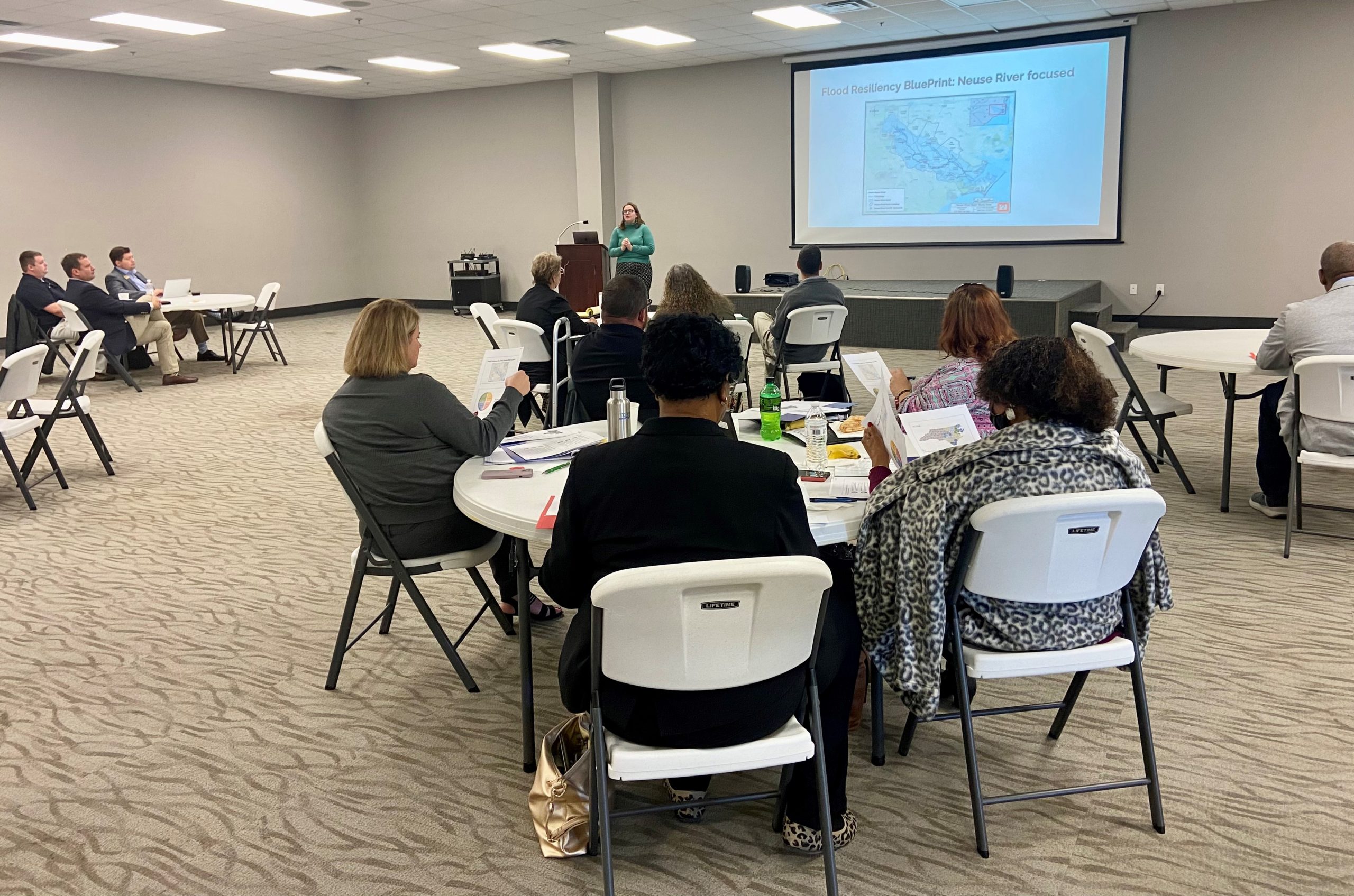

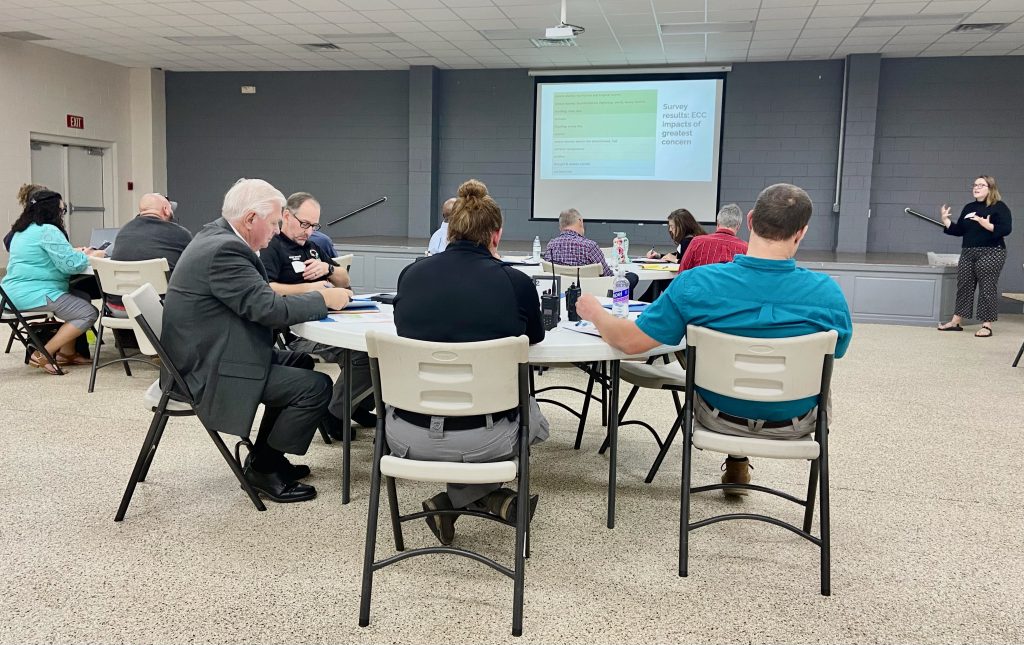
The 18 local governments that participated in the workshops received an individualized, user-friendly reports that summarized their individual community's project plan ideas and provided targeted funding opportunity recommendations and digital geospatial maps. The communities could use these reports to continue their disaster resilience efforts and pursue additional grant opportunities. There was follow-up technical assistance with communities that requested it.
The final report for ECC's partnership with the Upper Coastal Plain COG, Working Landscapes, and The Croatan Institute is at Eastern NC Small Town Disaster Resiliency Report - 2024.
Disaster Recovery Public Assistance (PA) Training Resources / Materials:
This training was developed by the NC Association of Regional Councils of Governments with support from NC Department of Public Safety and NC Emergency Management. This program is being administered through each of the sixteen councils of government (COG’s).
The goal of this training is to help prepare local government officials to better serve their communities before the next disaster strikes and to recover from disasters more quickly.
The focus of the training is preparing for and utilizing the FEMA Public Assistance program, which is often available to governments after a disaster.
This course is designed to make participants more aware of the Public Assistance (PA) Program, the tools, resources, and contacts they can call upon for support, and best practices to prepare for, respond to, and recover from disasters.
This training was designed as a 3-day training, and the course is broken into 3 modules highlighting the pre-disaster, post-disaster, and long-term recovery aspects of managing the Public Assistance process at the local government level. Each of the 3 modules was originally designed for one day of training.
The training materials are provided here:
NCARCOG Module 1 – Pre-Disaster Slides
NCARCOG Module 2 – Post-Disaster Slides
NCARCOG Module 3 – Long-Term Recovery Slides
ECC's Disaster Recovery - Public Assistance (PA) Training - Slides
ECC provided a condensed, one-day version of the training three times during the spring of 2024. In order to continue providing this information for the benefit of our member governments, we are continuing to provide this training through this online means.
ECC Module A – Pre-Disaster Slide
ECC Module B – Post-Disaster & Long-Term Recovery Slides
ECC's Disaster Recovery - Public Assistance (PA) Training - Video Presentations
ECC provides these videos as an introduction or refresher to FEMA’s (Federal Emergency Management Agency) Public Assistance (PA) program for local governments seeking disaster recovery funding. The PA program provides federal assistance based on emergency and major disaster declarations, and eligible projects can be broadly grouped as emergency work and permanent work (repair or replacement of facilities). Work must be for facilities that are the legal responsibility of the applicant. This is a reimbursement-based program, and it is vital that applicants prepare for participation before a disaster or emergency occurs.
Section 1 – Overview and Best Practices (Parts 1 and 2)
This is an overview of the PA program and best practices for participation, including key local government roles, policies, financial administration, documentation, and common risks that can impact funding obligation. This section is divided into two videos.
Section 1, Video 1
Section 1, Video 2
Section 2 – Phase 1
This video provides an overview of the PA program’s seven-phase delivery process followed by a closer review of Phase 1, Operational Planning & Applicant Coordination. Work categories eligible for reimbursement through the PA program, relevant documentation, and website portals are also covered.
Section 2 Video
Section 3 – Phases 2 and 3 (Parts 1 and 2)
This section covers Phases 2 and 3 of the PA program, where impacts and eligibility as well as scoping and costing are reviewed. Topics covered include developing a damage inventory and scope of work, developing cost estimates, types of PA projects, and eligibility requirements. Hazard Mitigation programs 404 and 406 are also briefly covered. This section is divided into two videos.
Section 3, Video 1
Section 3, Video 2
Section 4 – Phases 4 through 7
This video covers the remaining phases of the PA program delivery process: Phase 4, Final Reviews, Phase 5, Obligation and Recovery Transition, Phase 6, Project Monitoring and Amendments, and Phase 7, Final Reconciliation and Closeout. Topics include scope and cost amendments, time extension requests, audits, appeals of eligibility determinations, and the differences between closeouts for small, large, and alternative procedure projects.
Section 4 Video
Section 5 – Insurance
The last section provides a closer look at insurance requirements for the PA program and potential issues.
Section 5 Video
Additional Resources
Pictures from the In-Person Disaster Recovery Workshops:
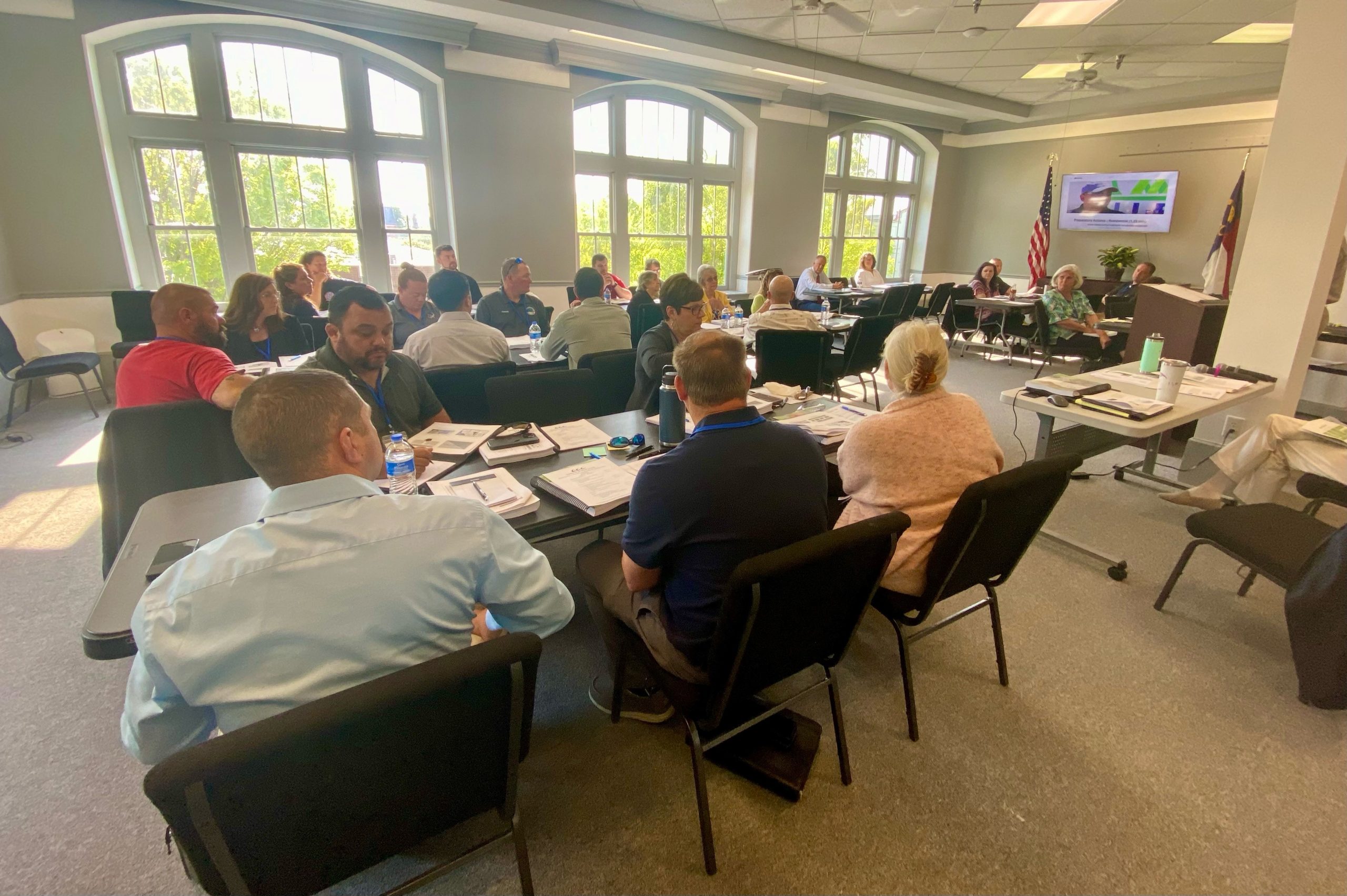
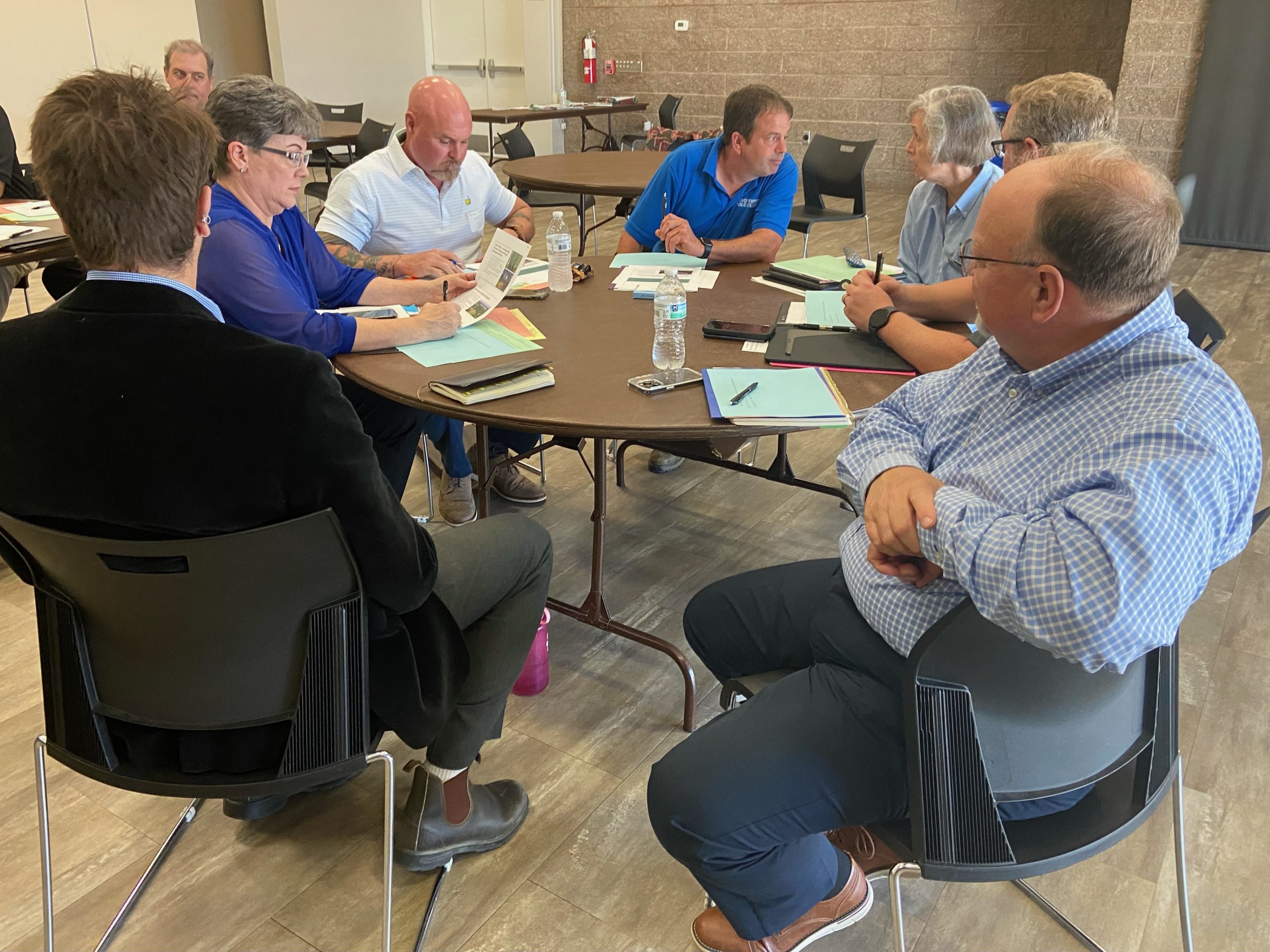
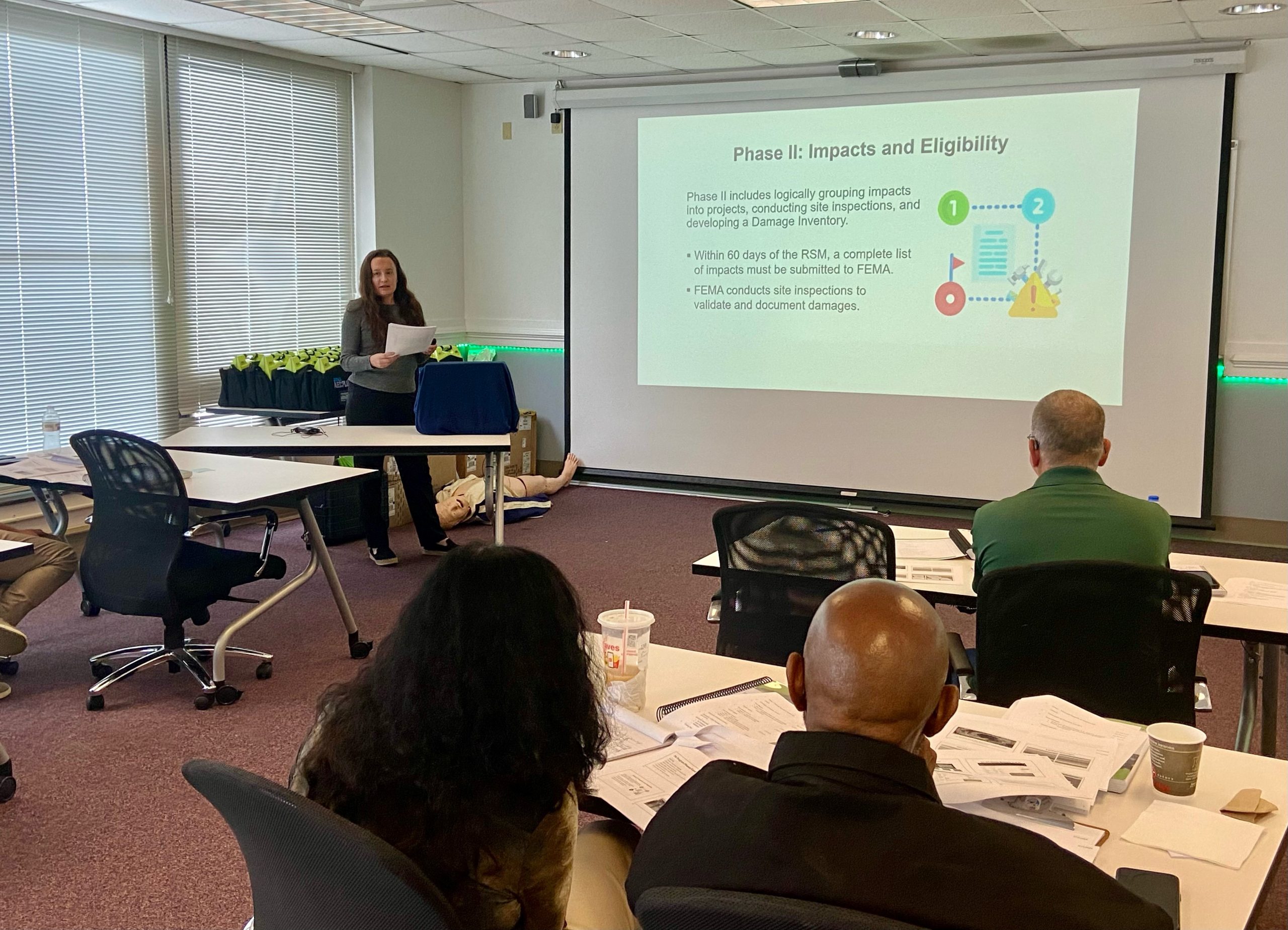
ECC’s Flood Mitigation Assistance (FMA) Program
ECC, along with 3 other councils of government, is working with the North Carolina Department of Public Safety on a Flood Mitigation Assistance (FMA) Capability & Capacity Building project. The focus is part of a 2-year program to work with local governments and NC Emergency Management to identify and fully develop 100 individual flood mitigation projects, secure voluntary homeowner participation, and provide administration of such projects in our region.
The ECC portion of the project involves Carteret, Craven, Duplin, Onslow, Pamlico, and Wayne counties. These counties were identified by the State as having the highest concentration of properties insured by the National Flood Insurance Program with repetitive flood damage.
Eligible jurisdictions include counties, cities & towns. Communities applying for FMA funding must be an NFIP participating community.
Factors affecting programming will include jurisdictional decisions for the level of program funding, whether to involve the ECC (which is at no cost to participating communities), or engaging a fee-based consultant, and sequencing through properties that have had severe repetitive losses (SRL) as defined by FEMA.
The FMA program offers the potential to elevate properties, cost sharing between owner and FEMA that is dependent upon a property’s categorization of either severe repetitive loss or repetitive loss (as determined by FEMA), with the homeowner’s cost share not to exceed 25% in any circumstance. The award and funding process is lengthy and will require patience by potential participants.
If you are interested in learning more about this program, contact ECC Senior Community Planner, Carlton Gideon, at cgideon@eccog.org or at 252-638-3185, ext. 3018.
Regions Innovating for Stronger Economies & Environment (RISE) Program – Eastern NC
The Eastern Carolina Council worked with the NC Office of Recovery and Resilience, (NCORR) to develop a portfolio of priority projects that strengthen regional resilience. This multi-phase effort includes a forward-looking vulnerability assessment, the identification of five to 10 high-priority projects and a list of the actions needed to implement each proposed project. A diverse stakeholder partnership is guiding the project to ensure that the scope of work reflects local priorities.
The Climate Change and Natural Hazards Vulnerability Assessment for the Eastern Carolina Region is a report describing past problems and future risks associated with extreme weather events such as hurricanes, flooding, extreme temperatures, droughts and wildfires. The report outlines the impacts of these climate hazards on housing, the environment and the economy.
The Regional Resilience Project Portfolio for the Eastern Carolina Region identifies priority projects and strategies that reduce the risks associated with extreme weather events and enhance regional resilience. The portfolio aims to produce shovel-ready actions with detailed implementation steps, including estimated costs, potential implementing partners, likely project completion challenges and more.
The RISE effort builds on analysis and planning conducted in recent years, which include regional hazard mitigation plans and other documents that are listed as Resource Documents HERE.
